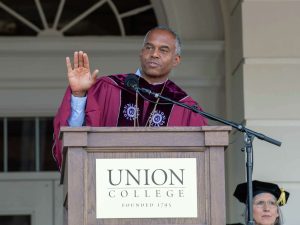Professors review online teaching experiences
April 16, 2020
As Union students finish the third week of online classes, Concordiensis talked to some of the Union Faculty via email about their experiences with the online classes so far.
After President Harris announced on March 17 that classes will be held online during the spring term, all academic departments started preparing for online classes. “It was hectic as we had only a short time to do it. I already use Nexus for posting readings and notes, but I had to learn how to use Zoom to record lectures and to host live discussions,” Professor Peter Bedford, Director of the Program in Religious Studies said. The Information Technological Services (ITS) have been doing a great job in supporting the faculty to prepare for the classes, according to Prof. Bedford. The faculty discussion boards and departmental groups have also helped in the planning, according to him.
Professor Rebecca Cortez from the Mechanical Engineering department echoed similar thoughts, “While preparing for online teaching, it was inspiring to hear the innovative ideas that came from my department colleagues and from faculty across campus. Knowing that we were moving forward together gave me the confidence that I could do this. “
Different faculty members have come up with varying approaches to teach courses for the term. Professor Jeffrey Hatley from the Mathematics Department surveyed the students about “their own situations (time zones, internet accessibility, quiet study spaces at home, etc) and tried “to plan for the unexpected (internet outages, illness, etc).” Based on this, he adopted the “flipped classroom” approach, where he recorded short lecture videos to supplement textbook readings, and then used scheduled Zoom sessions as recitation periods to answer questions and work.
Professor David Siegel from the Political Science department said that he’s using a variety of tools such as Zoom breakout rooms, Perusall assignments and Kialo to add some interactive elements into the coursework. “But there are clear limits to how interactive a classroom can be when everything is online,” Prof. Siegel said.
The online setting has also impacted the interactions between the students and the instructors. “I miss the direct interactions with the students. This is not limited to classes. I miss talking with them during the day and hearing about other activities they are involved in,” Prof. Cortez said.
Prof. Bedford expressed that a potential problem is not getting “immediate feedback” from the students which can help instructors “get a feel for how the class is going” and make necessary adjustments while they’re teaching. At the same time, it can be hard to gauge the student’s performance in class when you don’t see them daily, according to Prof. Hatley. “Normally I see my students several times a week, I collect and grade weekly assignments, and I can gauge each student’s progress quite naturally,” he said. It’s different this term, according to him since not all of his students attend Zoom sessions and he doesn’t want to “force” students to attend them. “Even those who show up often choose not to turn their cameras or microphones on — and again, that is totally okay. It just creates a disconnect that I wish wasn’t there,” Prof. Hatley said.
“Union’s committed to the value of a residential college education. I wholeheartedly agree with that. And I believe our students come to Union for exactly this educational experience,” Prof. Bedford said. He believes that this experience will not significantly change the teaching culture at Union however it will make faculty more comfortable with using certain teaching technologies. Prof. Cortez hopes to learn more about the “novel teaching approaches that were used this term and how they can be used in future classes” when in-person classes resume.
“I think it [coming back to campus] will remind everyone, students and faculty alike, how special our community is, and it will make everyone more appreciative of the time we spend together on campus: in the classroom, in the dining halls, on the quad, everywhere,” Prof. Hatley said.







